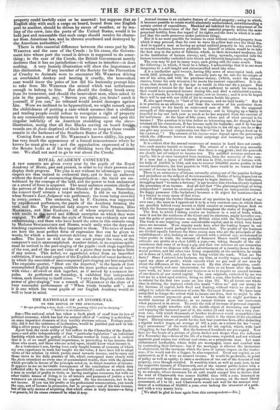ROYAL ACADEMY CONCERTS.
A raw concerts are given every year by the pupils of the Royal Academy of Music, past and present, in order to try their prowess and display their progress. The plan is not without its advantages: young singers are thus trained to orchestral duty, and to face an audience without the dread of encountering disapprobation ; the timid are em- boldened by the courage of the bold, and the power to look undaunted on a crowd of faces is acquired. The usual audience consists chiefly of the patrons of the Academy and the friends of the pupils. Sometimes the concert itself attracts a larger audience. It did so on Saturday, when SPOHR'S Last Judgment was performed ; the room being crowded In every„ corner. The orchestra, led by F. CRAMER, was supported by experienced performers, the pupils of the Academy forming the rank and file. The principal lady singers were Miss STEELE, Miss MeasaeLL, and Miss BASSANO ; all of whom acquitted themselves with credit in gaik novel and difficult enterprise on which they were engaged. To ifillEof them the style of SPOHR was evidently new and embarrassing ; and those who have heard the solos in this oratorio sung by Madame STOCKHAUSEN and Hostas, would sadly miss the deep and touching expression which they imparted to them. The notes of music are here the most perfect form of expression that can be given to words, for which a merely correct delivery in time and tune will not suffice. The heart as well as the ear must prompt the voice, or the composer's end is unaccomplished. Another defect, in no captious spirit, must be noticed in the part-singing of the pupils : each sings regardless of the rest, and of the use and value of a piano they seem to have little if any notion. This defect, we apprehend, arises from an imperfect cultivation, if not a total neglect of the English school of vocal harmony ; in which the essentials of unaccompanied part-singing are best acquired. The exquisite quartet, "Blest are the departed," in the hands of four accomplished English singers, exhibits the most perfect union of voice with voice : all swell or sink together, as if moved by a common im- pulse. As performed on Saturday, it exhibited fonr independent voices, each listening to itself alone. "I envy the English artists their power of gleeLsinging," was a remark of MALIBRAN at the close of a very successful performance of "When winds breathe soft "; and it is one which the vocal pupils of our English Academy would do well to bear in mind.


























 Previous page
Previous page